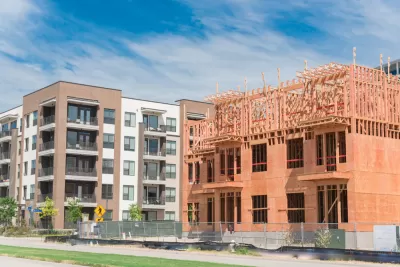A tax break approved by the Texas Legislature is delivering massive benefits to developers in the state, but advocates say the public isn't getting the promised return on investment.

Eric Dexheimer shares news of new analysis from researchers at the University of Texas School of Law about the effect of a 2015 tax break approved, ostensibly, for affordable housing projects in Texas. The tax break was approved in a last minute amendment "onto a densely worded bill updating finance statutes" by Republican State Senator Craig Estes and promised to deliver a financial boost to affordable housing developers.
"Since then, the one-sentence amendment has resulted in private developers receiving tens of millions of dollars in property tax breaks. It has saved them millions more in tax-free construction costs — all with scant benefit to the public," explains Dexheimer of the findings of the study released earlier this week.
In response to the quick popularity of the tax break for projects around the state, estimated by the report to deliver annual property tax breaks to apartment developers of close to $1 million per property on average, advocates are pressing back on the idea that the project is delivering promised low-income housing.
[T]hanks in part to a series of loopholes buried in the paperwork, the so-called affordable housing created in exchange for the 2015 tax breaks often is as expensive as market-rate apartments, said Heather Way, a professor at the Austin law school and lead author of the study. “The public’s just not getting the return on its investment,” she said.
John Henneberger, co-director of the Texas Low-Income Housing Information Service, is quoted in the article raising the stakes on Way's statement. Henneberger says the tax break is a misuse of taxpayer funds.
FULL STORY: How a big Texas tax break created not-so-affordable housing

Planetizen Federal Action Tracker
A weekly monitor of how Trump’s orders and actions are impacting planners and planning in America.

Chicago’s Ghost Rails
Just beneath the surface of the modern city lie the remnants of its expansive early 20th-century streetcar system.

San Antonio and Austin are Fusing Into one Massive Megaregion
The region spanning the two central Texas cities is growing fast, posing challenges for local infrastructure and water supplies.

Since Zion's Shuttles Went Electric “The Smog is Gone”
Visitors to Zion National Park can enjoy the canyon via the nation’s first fully electric park shuttle system.

Trump Distributing DOT Safety Funds at 1/10 Rate of Biden
Funds for Safe Streets and other transportation safety and equity programs are being held up by administrative reviews and conflicts with the Trump administration’s priorities.

German Cities Subsidize Taxis for Women Amid Wave of Violence
Free or low-cost taxi rides can help women navigate cities more safely, but critics say the programs don't address the root causes of violence against women.
Urban Design for Planners 1: Software Tools
This six-course series explores essential urban design concepts using open source software and equips planners with the tools they need to participate fully in the urban design process.
Planning for Universal Design
Learn the tools for implementing Universal Design in planning regulations.
planning NEXT
Appalachian Highlands Housing Partners
Mpact (founded as Rail~Volution)
City of Camden Redevelopment Agency
City of Astoria
City of Portland
City of Laramie





























